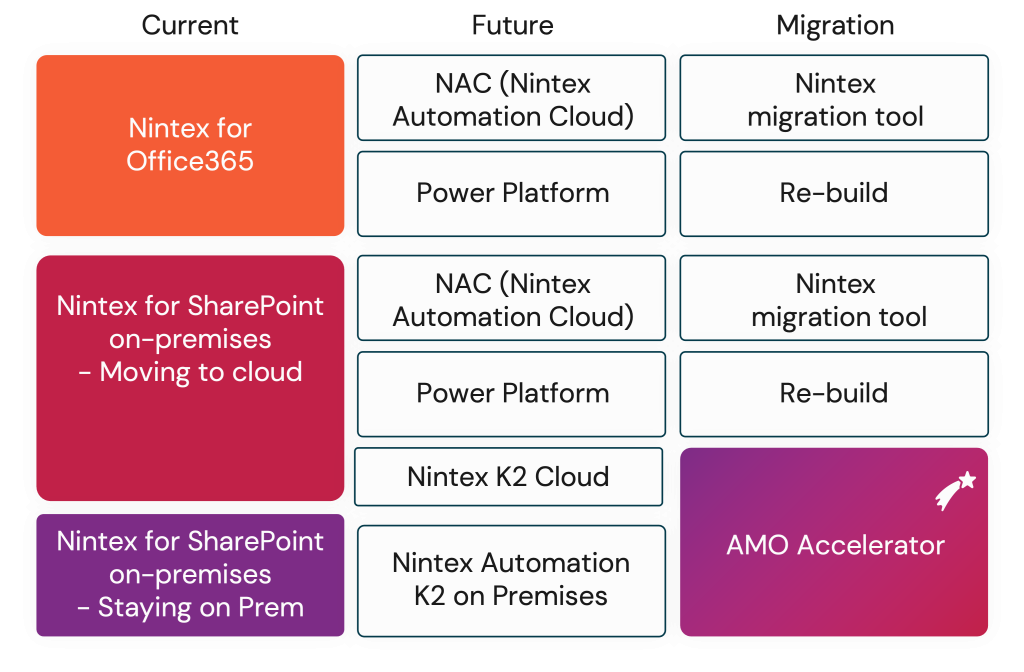
With the end of support for the SharePoint workflow engine, organisations relying on Nintex for SharePoint are now at a crossroads. The decision ahead isn’t just about replacing a workflow engine—it’s about futureproofing your automation strategy.
In this blog, we break down your options and explore how you can move forward with confidence, whether your organisation is ready for the Cloud or prefers to remain On-Premise. We will also look into the AMO Accelerator and the Nintex migration tools that can be used for a smooth transition.
Many organisations still run their business processes on SharePoint On-Premise (2016, 2019, or other versions) with Nintex workflows tightly integrated. However, with Microsoft’s decision to end support for its classic workflow engine, the clock is ticking.
You now have two broad directions to consider- Either you move to a
Whichever path you choose, there are powerful solutions available to ensure a seamless transition and continued automation success. The table below shows your different options for transition:

Transitioning to the cloud opens the door to modernisation, scalability, and flexibility. When paired with next-gen automation platforms, this move enables a complete rethink of your business processes.
Your platform options in the cloud are:
Let’s take a closer look at NAC—an ideal replacement for legacy SharePoint workflows.
NAC is a 100% Cloud-based automation platform, offering a future-ready alternative to Nintex for SharePoint.
Eliminate infrastructure costs and dependencies. NAC is always up-to-date and maintenance-free.
With its drag-and-drop, no-code/low-code interface, NAC makes it easy for users across departments to create, manage, and track workflows.
NAC connects beyond SharePoint, integrating with CRMs, ERPs, SaaS platforms, and over 100 native connectors including Microsoft 365, Salesforce, and SAP.
Designed for scale, NAC handles large volumes with guaranteed availability and built-in analytics.
For teams seeking fast, effective automation without infrastructure concerns, NAC is a powerful step forward.
If your organisation requires full control or must remain On-Premise for compliance, there’s still a strong path forward: upgrading to SharePoint Server Subscription Edition (SE) combined with Nintex Automation K2.
K2 provides an enterprise-grade solution that goes beyond workflows. It’s a full low-code application development platform that lets you design complex workflows, build custom apps, and orchestrate processes across your business.
Model and automate sophisticated workflows that span multiple systems.
Prioritise, assign, and resolve tasks efficiently with built-in tools.
From branding to APIs and connectors, K2 lets you build precisely what you need.
Deploy On-Premise, in Private Cloud, or use a hybrid model.
K2 is ideal for organisations with deep integration needs, complex processes, and the desire to build powerful, customised applications.
Choosing the right platform depends on your automation goals, IT landscape, and internal capabilities. The table below summarises the features of K2 v/s NAC
| Feature | K2 (On-prem & Cloud) | NAC (Cloud-Only) |
|---|---|---|
| Best for | Enterprise-wide automation, complex workflows | Fast, targeted automation |
| Customisation | High flexibility, customisable interfaces | Pre-built templates, out-of-box functionalities, faster deployment |
| Integration capabilities | Connects with legacy systems & custom-built apps | Optimised for modern cloud-native tools (Microsoft 365, Teams, Power Platform) |
| Workflow complexity | Advanced workflows, approvals & escalations | Standard workflow for business processes |
| Use case | Enterprise-grade automation across multiple departments | Fast, efficient automation of specific tasks |
Whether you are moving to NAC or K2, planning your migration properly is key to avoiding disruption. Nintex offers a dedicated migration tool for those who wish to move to NAC. While our team has developed the AMO Accelerator to streamline migrations to K2.
The AMO Accelerator is not just a migration tool—it’s a framework for transformation. We are talking about rethinking automation – building something more scalable, maintainable, and aligned with your future business needs.
We don’t just replicate your existing workflows—we analyse, streamline, and redesign them to fit a modern, efficient structure. Many organisations built hundreds of SharePoint workflows over time due to technical constraints. The Accelerator helps you consolidate and simplify that sprawl.
A ready-to-deploy K2 foundation that contains pre-configured templates, connectors, and assets is provided to significantly reduce development time. This creates a standardised base for all your future business apps.
Where others start from scratch, we use a modular design approach—meaning once you build a form, integration, or process, it can be reused across departments and applications. It’s efficient, consistent, and future-friendly.
Every implementation of the AMO Accelerator is tailored. We align the structure to your industry, compliance requirements, internal governance model, and the skillsets of your internal team.
One of our core goals is to make you self-sufficient. The Accelerator comes with documentation, governance models, training, and guided transitions. Your internal teams will be empowered to build and manage new K2 applications independently.
| Benefit | AMO Accelerator | Traditional migration |
|---|---|---|
| Process reengineering | ✓ Included | ✗ Often skipped |
| Workflow consolidation | ✓ Up to 10:1 reduction | ✗ 1:1 rebuilds |
| Speed to value | ✓ Rapid delivery with pre-built assets | ✗ Slower manual rebuilds |
| Team enablement | ✓ Training and autonomy post-migration | ✗ Ongoing external dependency |
| Future-proofing | ✓ K2 foundation for long-term scaling | ✗ Limited to current state |
| Tailored governance | ✓ Structured, aligned to your org needs | ✗ Ad-hoc inconsistent |
Delaying your transition to the last minute can put your organisation at risk. Whether you are modernising in the cloud or staying on-prem, we are here to help make the move smooth, strategic, and sustainable.
Let’s talk about your current set-up and explore the next step for your organisation. Have a chat with our team!
We gather information about your needs and objectives of your apps. Unsure about the app you need? We will carefully assess your top challenges and provide expert guidance on the perfect solution tailored to your success.
We create wireframes and an interactive prototype to visualise the app flow and make changes as per your feedback.
Estimation of the project deliverables including the resources, time, and costs involved.
Showcasing POC to relevant stakeholders illustrating the functionalities and potential of the app to meet business objectives.